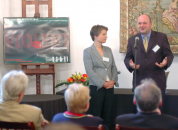
The ceremony of awarding the Sergio Vieira de Mello Prize took place within the framework of an international conference “Non-violent Revolutions” on 6 October 2005 at Villa Decius, Krakow. Among the laureates there are: Marian Żelazek SVD (In the “individual” category) and The Krzyżowa Foundation for European Understanding (In the “NGO” category).
- Rev. Marian Żelazek SVD (1918-2006)
In January 1940 he is interned by Gestapo and taken away to the concentration camp in Dachau together with many priests where he was until the camp liberation on the 29th April 1944. 1944 to 1948 he studied theology at the Anselmianum Institute in Monte Aventino in Rome. Then he applied for the work assignment in India. He arrived to Bombai in 1950 and got to the missionary station in Kesramal. After several months when he was learning local languages he started working among members of the Adiba tribe in Sambalpur in the northern part of the Orissa state. In 1975 he took over a post in Puri, one of the holiest Hindu towns where he was working up to his death. He organized life in the colony of over 600 lepers providing them with shelter, treatment and work. For the children of leper families he founds the Beatrixintegration school where the leper kids were taught to live together with the healthy ones. He died in 2006 and was buried in Jharsuguda.
- The Krzyżowa Foundation for European Understanding
The Foundation was established in 1990 by Poles, Germans, Dutch and Americans, co-operating with the Club of Catholic Intelligentsia from Wrocław. The goal of the Foundation is peaceful, democratic coexistence of different nations, through mutual understanding of social groups and individuals. The meeting centre in Krzyżowa in Lower Silesia is a special historic location. A German resistance group, the Kreisau Circle, held secret meetings in this village during World War II giving an example of civil courage and co-operation despite political and religious differences. Helmuth James von Moltke, to whom the entire estate belonged at that time, was one of the leaders of the group. In November 1989 Krzyżowa was chosen for the Polish-German Mass of Reconciliation, a symbolic turning point in Polish-German relations after Poland rejoined the family of democratic countries. Three main activity groups of the Krzyżowa Foundation help to promote mutual understanding: Inter-national Youth Meeting Centre, European Academy and Memorial Place. Guests of the meeting centre at Krzyżowa are not only participants of the meetings organized by the Foundation, but also companies and businessmen. They organize here their own conferences, presentations and training courses. The Krzyżowa Foundation is present in Wrocław too. The office in the main city of Lower Silesia supports the programme activity fostered in Krzyżowa and helps to finance it.Website: www.krzyzowa.org.pl




